Guidelines
Guidelines
Improving surgical outcomes through collaborative research
The NIHR Global Health Research Unit on Global Surgery
Improving surgical outcomes through collaborative research
Guidelines
Many clinical guidelines are developed by high‐income country institutions with little consideration given to either the evidence base for interventions in LMICs, or the specific challenges LMIC health systems may face in implementing recommendations.
Through a Delphi exercise, the GSU prioritised topics for global surgery guideline development and work was undertaken across the research Hub network to develop top prioritised guidelines. The results of the Delphi exercise were reported in BJS.
A key aspect of the work we do revolves around the notion of informing national guidelines through reaching for example national surgical societies and health service providers. With our hub directors, we have established a consensus process for refining rationalised ‘Essential Surgical Guidelines’ to support care delivery across LMICs. In response to COVID-19, for example, a range of related projects international including surgical guidelines have been undertaken and published.
Global Surgical Guidelines for Prevention of Surgical Site Infections
Surgical site infection (SSI) is the commonest postoperative complication in abdominal surgery. SSI causes patients to experience pain and delays return to normal activities such as work. Additional SSI-related health costs can cause financial hardship, particularly for the most vulnerable patients in LMICs. Treatment of SSI is increasingly challenging due to the rise of antibiotic resistance, which occurs in up to 46% of LMIC patients. This places a strong focus on preventing SSI from occurring in the first place.
We have worked with surgeons representing 13 LMICs to collaboratively adapt existing high income country guidance to produce a guideline that reflects the challenges of delivering surgery in LMICs, and allows health providers to prioritise implementation of key interventions that are most likely to benefit patients.
The ‘Global Surgery Guideline for the Prevention of Surgical Site Infection’, published in BJS, has identified practical steps that all hospitals should urgently take to both reduce avoidable infections and the spread of antimicrobial resistance. In addition, a further three ‘desirable’ recommendations are made in the guideline. It is recognised that worldwide some hospitals may lack the necessary resources to immediately implement these interventions, in which case they should plan strategies to introduce these interventions in the future.
Global Guidance for Surgical Care During the COVID-19 Pandemic


Global Guidance for surgical care during the COVID-19 pandemic
Surgeons worldwide urgently need guidance on how to deliver surgical services safely and effectively during the COVID-19 pandemic. The key outcomes from a scoping search conducted to identify published articles relating to management of surgical patients during pandemics are published in the BJS and outlined in the poster below.
Bringing together surgeons, researchers and policy makers to set the local research agenda according to patient need in LMIC and ensuring all patients have the opportunity to take part in our research.
Pump Priming
Pump Priming
Improving surgical outcomes through collaborative research
The NIHR Global Health Research Unit on Global Surgery
Improving surgical outcomes through collaborative research
Pump Priming
The NIHR Global Health Research Unit on Global Surgery is committed to building and strengthening research capacity in areas specifically relevant to patients in our low and middle income (LMIC) partner countries.
Each year as part of our annual research prioritisation workshop, researchers from our partner countries are invited to submit research proposals for consideration for seed funding from the NIHR Global Surgery Unit.
The successful bids receive pump-priming funding together with mentoring from academics across the Unit in order to develop and conduct their research projects. It is anticipated that this initial funding will generate early pilot data that will be used to inform applications for future grant funding and so develop these projects in to larger studies and trials across the NIHR Global Surgery Unit network.
Studies selected to receive pump-priming funding are outlined below:
Pump Priming Research
STARFISH STUDY
SToma cARe For Improvement reSearcH (STARFISH): Epidemiologic study of stoma cases in Lower- and Middle-Income Countries and qualitative research on the challenges on stoma care.
The STARFISH study uses a mixed methods approach to assess the burden and challenges of stoma care in low and middle income settings.
Based at the Unit’s Centre in the Philippines and led by Dr Maria Carmela Lapitan at the University of the Philippines in Manilla, Starfish comprises 3 separate sub-studies:
1. A survey at selected healthcare facilities to collect data on stoma incidence, types, indications and complications.
2. Focus groups and one-to-one interviews with patients, carers and health care providers involved in stoma care
3. Development of a questionnaire for stoma patients in low and middle income settings to collect standardised data on stoma care
TIGER STUDY
TIGER (Task shifting Inguinal hernia Repair between surgeons and technicians): development of a randomised trial in low and middle income countries
Can technicians perform mesh inguinal hernia repair safely and cost-effectively in rural surgical settings in low and middle income countries?
This pilot trial aims to investigate delivery of a standardised, measurable training programme for technicians to perform a mesh inguinal hernia repair.
Educational Visits
As part of the pump-priming funding stream, the Global Surgery Unit is supporting educational visits between our international partners, sharing knowledge and experience.
Honey wound dressings for the management of chronic wounds in Ghana
Honey is well documented to have anti-bacterial and anti-fungal properties, however there is currently insufficient evidence to demonstrate that honey wound dressings are effective in the treatment of chronic wounds.
Medical grade honey is currently available but not yet in use in Ghana. This project funded an educational trip for Dr Edwin Yenli and Dr Etch Ighohwo from the NIHR Global Surgery Unit hub in Ghana to visit colleagues at our South African hub in order to observe wound care at specialised units.
To read a full report on Dr Yenli and Dr Ighohwo’s visit please click here.
The WHO Surgical Safety Checklist
In the 10th anniversary year of the WHO Surgical Safety Checklist (WHO SSC), this project aims to determine usage and compliance with the WHO SSC in referral and district hospitals in Rwanda and Malawi.
Led in partnership by Dr JC Allen Ingabire from The NIHR Global Surgery Unit hub in Rwanda and Dr Vanessa Msosa at Kamuzu Central Hospital in Malawi, the study will audit knowledge and usage of the WHO SSC amongst approximately 1000 theatre users at 24 rural and district hospitals in Rwanda and 10 in Malawi.
During a defined 3-day data collection period, operations taking place in general surgical and obstetrics & gynaecology theatres will be audited to investigate if the WHO SSC is available to the whole surgical team and being used to record key variables during every operation performed.
LION STUDY
LION (LaparoscopIc Versus Open Appendectomy): Cost comparison in a lower- middle income setting
This study aims to compare the outcome and cost of conventional open and laparoscopic appendectomy for clinically confirmed, uncomplicated, acute appendicitis in a low resource setting. Although the cost effectiveness of laparoscopic surgery has been investigated previously in high human development index (HDI) countries, similar studies are lacking in low and middle HDI countries.
Led by Dr Adewale Adisa at the NIHR hub in Nigeria, this study will compare outcomes following open and laparoscopic appendectomy in approximately 150 patients at 3 hospitals in Nigeria.
Burns Care
Burns are a significant contributor to the burden of disease in low- and middle-income countries (LMIC). Although current guidelines recommend treatment in specialised treatment centres, such centres are few or non-existent in many LMIC settings.
Led by Dr Chikwendu Ede and Dr Rachel Moore from the NIHR Global Surgery Unit hub in South Africa, this is a prospective observational study comparing outcomes of burns treatments between non-specialised and specialised burns units. Information on 90 day mortality will be collected over a 6 month period at up to 9 non-specialised hospitals treating adult burns patients and compared to outcomes for patients at a dedicated burns unit at Chris Hani Baragwanarth Academic Hospital in Soweto, Johannesburg.
Wound dressing practices to decrease Surgical Site infections in low and middle income countries
Led by Dr Faustin Ntirenganya and Dr Christophe Mpirimbanyi from the NIHR Global Surgery Unit hub in Rwanda, this mixed methods study assesses knowledge, attitudes and practices around surgical wound dressing amongst nurses, general practitioners and surgeons in Rwanda.
The study, conducted at 3 hospitals in Rwanda, will determine types of commonly used dressings and indications for dressing change, evaluate cost implications of wound dressings, and investigate patients’ and health professionals ‘beliefs / perspectives’ regarding the feasibility of a future RCT.
Primary outcome measure will be surgical site infection at 30 days; secondary outcome measures will include length of hospital stay, dressing costs, patient satisfaction and complication rates.
Abdominal Tuberculosis in children – pattern and treatment outcomes
This study led by the NIHR Global Surgery Unit hub in India examines the pattern of abdominal tuberculosis in children and investigates the effectiveness of various treatment regimens, exploring the response of paediatric patients to medical intervention alone, to a surgical approach alone, and to a combined approach.
This involves a retrospective and follow up study of all abdominal tuberculosis cases treated as in-patients in the departments of paediatrics and paediatric surgery at the Christian Medical College & Hospital, Ludhiana from 1st August 2007 to 31st July 2017. Anonymised data on these patients is being studied from medical records and includes information related to demographics, socioeconomic and nutritional status, clinical findings, investigations, radiological findings and treatment related data. Further approaches such as patient interviews are being employed to supplement the available data.
Bringing together surgeons, researchers and policy makers to set the local research agenda according to patient need in LMIC and ensuring all patients have the opportunity to take part in our research.
Cancer
Cancer
Improving surgical outcomes through collaborative research
The NIHR Global Health Research Unit on Global Surgery
Improving surgical outcomes through collaborative research
Cancer
Surgery often offers the best chance of cure, particularly in early-stage disease. It is estimated that 45 million surgical procedures are needed each year worldwide, yet fewer than 25% of patients with cancer have access to safe, affordable, and timely surgery.
Death rates from cancer are falling in high income countries, but continue to rise in LMICs. Up to 1.5% of GDP is lost due to cancer in some LMIC regions. In 2018, GlobalSurg Collaborative conducted the biggest ever international study into surgical outcomes for cancer patients. 3000 collaborators in 84 countries collected evidence from <15,000 patients.
Cancer Research
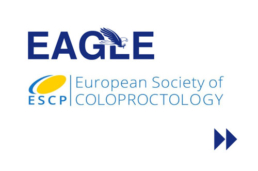
EAGLE STUDY
The ESCP Safe-anastomosis Programme in Colorectal Surgery (EAGLE) is an international, cluster randomised-sequence study of a Safe-anastomosis Quality Improvement Intervention to reduce anastomotic leak following right colectomy and ileocaecal resection
Anastomotic leak is a severe, potentially life-threatening complication following right colectomy. Internationally, anastomotic leak occurs after 8% of right colectomies. Prospective cohort data demonstrate that patient selection, intraoperative factors, and technical variation are risk factors for anastomotic leak.
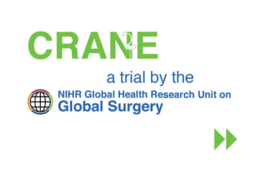
CRANE STUDY
CRANE is a feasibility study of a nutritional intervention to improve outcomes after cancer surgery in low-income countries. It aims to identify and validate a nutritional screening tool; identify a low cost sustainable nutritional intervention; and investigate recruitment and retention, data collection methods and the acceptability of a nutritional intervention to improve outcomes after cancer surgery in low- and middle-income countries.
The health economics component looks at the feasibility of collecting economic data and the design of resource use forms for a full trial. The health economics is particularly important essential given the importance of cost effectiveness in developing a long term sustainable solution.
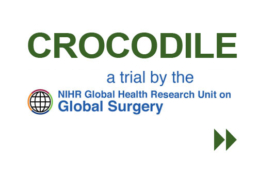
CROCODILE STUDY
‘Little is known about colorectal cancer treatment delivery in India and the associated costs. CROCODILE aims to identify financial and non-financial barriers for colorectal cancer treatment compliance in India.’
Bringing together surgeons, researchers and policy makers to set the local research agenda according to patient need in LMIC and ensuring all patients have the opportunity to take part in our research.
Covid-19
Covid-19
Improving surgical outcomes through collaborative research
The NIHR Global Health Research Unit on Global Surgery
Improving surgical outcomes through collaborative research
Covid-19
COVID-19 has highlighted the limited resilience of global surgery. Our research has shown that 50 million operations were cancelled in the first pandemic wave. Re-starting surgery in the face of pre-existing systemic issues has been a major global challenge, and has been only partially successful to date.
LMICs already faced a burden of low surgery volumes, lacking at least 143 million operations per year. An increase in capacity is urgently needed to tackle the expanding non-communicable disease burden, whilst providing resilient services that can survive external forces.
Our use of existing and new data produce policy influencing analyses that can directly inform the recovery and expansion of surgery at a global scale.
In November 2020 GSU published its first report on how to tackle surgery in the COVID-19 era and how surgical services may be reorganised to deal with the aftermath of the pandemic (visit: https://redcap.link/siureport)
Covid-19 Research
CovidSurg is a platform of studies aiming to explore the impact of COVID-19 in surgical patients and services. Our studies are designed and delivered by an international collaborating group of surgeons and anaesthetists which reached more than 80 countries.

COVIDSURG
Improving surgical outcomes through collaborative research
Patients diagnosed with COVID-19 who need surgery are a challenging group. Capturing real-world data and sharing international experience will inform the management of this complex group of patients who undergo surgery throughout the COVID-19 pandemic, improving their clinical care.
Primary aim
- To determine 30-day mortality in patients with COVID-19 infection who undergo surgery. This will inform future risk stratification, decision making, and patient consent.

COVIDSURG - CANCER
Improving surgical outcomes through collaborative research
Any centre performing elective cancer surgery affected by COVID-19 could participate in this study. Investigators could choose one or more cancer types from their centre from which to upload data. This study could be performed prospectively, retrospectively or using a mixed model, dependent on the phase of COVID-19 infection in that team’s hospital.
Primary aim
- To evaluate the 30-day postoperative pulmonary complication rate following elective cancer surgery during the COVID-19 pandemic.

COVIDSURG WEEK
Improving surgical outcomes through collaborative research
CovidSurg Week is an international multi-centre prospective cohort study in which patients from all specialities undergoing a surgical procedure done in an operating theatre could be included (any SARS-CoV 2 status).
Primary aim
- To determine the optimal timing for surgery following SARS-CoV-2 infection.

COVIDSURG 3 - OMICRON
Improving surgical outcomes through collaborative research
With the emergence of the Omicron SARS-CoV-2 variant of concern, there is currently little evidence regarding disease severity in both vaccinated and unvaccinated patients (including in surgical patients), nor is there data to guide patient risk stratification during Omicron COVID-19 waves.
This new study aims to provide renewed rapid data to guide global practice during Omicron COVID-19 waves.
CovidSurg-3 has two separate components:
- Patient-level component: Collection of outcome data for patients with peri-operative SARS-CoV-2.
- Hospital-level component: Collection of aggregated case-mix data. Hospitals in countries with low community SARS-CoV-2 infection rates can contribute towards this component.
Primary aim
- To determine 30-day mortality in patients with peri-operative SARS-CoV-2 infection. This will inform future risk stratification, decision making, and patient consent.
Key Documents
- Study Protocol can be accessed here
- Study Protocol appendix can be accessed here
- Data collection sheet (patient level) can be accessed here
- Data collection sheet (hospital level) can be accessed here
Key Documents for Patients
A range of documents for patients who may be either planning for or about to undergo an operation during the COVID-19 pandemic can be accessed here.
Bringing together surgeons, researchers and policy makers to set the local research agenda according to patient need in LMIC and ensuring all patients have the opportunity to take part in our research.
Pediatric Surgery
Paediatric Surgery
Improving surgical outcomes through collaborative research
The NIHR Global Health Research Unit on Global Surgery
Improving surgical outcomes through collaborative research
Pediatric Surgery
Building paediatric surgical capacity through research will also be an important aspect of the Global Surgery Unit’s work. A costing study in abdominal tuberculosis in children across various sites in India, for example, forms one of the various health economic workstreams currently taking place.
Further information on this study, along with our other work that looks into driving surgical improvements in LMICs can be found via the links below.
Pediatric Surgery
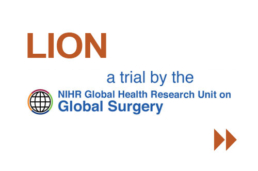
LION STUDY
LION (LaparoscopIc Versus Open Appendectomy): Cost comparison in a lower- middle income setting
This study aims to compare the outcome and cost of conventional open and laparoscopic appendectomy for clinically confirmed, uncomplicated, acute appendicitis in a low resource setting. Although the cost effectiveness of laparoscopic surgery has been investigated previously in high human development index (HDI) countries, similar studies are lacking in low and middle HDI countries.
Led by Dr Adewale Adisa at the NIHR hub in Nigeria, this study will compare outcomes following open and laparoscopic appendectomy in approximately 150 patients at 3 hospitals in Nigeria.
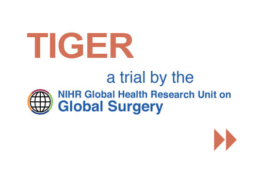
TIGER STUDY
TIGER (Task shifting Inguinal hernia Repair between surgeons and technicians): development of a randomised trial in low and middle income countries
Can technicians perform mesh inguinal hernia repair safely and cost-effectively in rural surgical settings in low and middle income countries?
This pilot trial aims to investigate delivery of a standardised, measurable training programme for technicians to perform a mesh inguinal hernia repair.
Bringing together surgeons, researchers and policy makers to set the local research agenda according to patient need in LMIC and ensuring all patients have the opportunity to take part in our research.
Rural Networks
Rural Networks
Improving surgical outcomes through collaborative research
The NIHR Global Health Research Unit on Global Surgery
Improving surgical outcomes through collaborative research
Rural Networks
Our work in FALCON, CHEETAH and TIGER has enabled the GSU to create pathways to rural communities. These communities are often under-represented within surgical based research, despite the fact that so many patients within LMICs may reside within rural settings.
We have also embedded rural communities into our community engagement and involvement plan.
This will provide an invaluable extension to the CEI program by ensuring the priorities of rural communities are recognised.
More information on this area of our research can be obtained via the links below.
Rural Networks Research
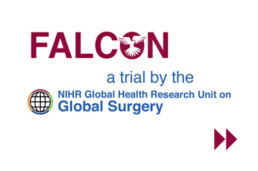
FALCON TRIAL
The FALCON trial looks into the prevention of surgical site infections (SSI) in low- and middle- income countries.
The health economics sub-study within FALCON is named KIWI (Key Resource Use In Wound Infection).
Surgical site infection (SSI) is a worldwide problem which has morbidity, mortality and financial consequences .Previous studies in LMICs on the costs of SSI have been limited by small sample size single-centre hospitals which did not capture costs occurring after hospital discharge. The lack of follow up is a problem as SSI can occur after discharge and costs associated with SSI have been shown to persist beyond 30 days. The main FALCON trial is assessing different treatment combinations to reduce Surgical Site Infection (SSI). The FALCON KIWI sub study is assessing the resource use and costs for patients with and without SSI across several hub countries.
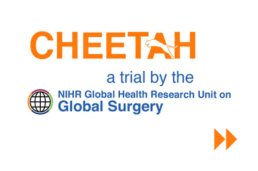
CHEETAH TRIAL
The main CHEETAH trial is assessing whether the practice of using separate, sterile gloves and instruments to close wounds at the end of surgery can reduce surgical site infection at 30-days post-surgery for patients undergoing clean-contaminated, contaminated or dirty abdominal surgery, compared to current routine hospital practice.
Using information from FALCON KIWI and primary data collection in CHEETAH, the cost-effectiveness of the changing gloves/instruments prior to wound closure compared to current routine hospital practice will be assessed.

TIGER STUDY
TIGER (Task shifting Inguinal hernia Repair between surgeons and technicians): development of a randomised trial in low and middle income countries
Can technicians perform mesh inguinal hernia repair safely and cost-effectively in rural surgical settings in low and middle income countries?
This pilot trial aims to investigate delivery of a standardised, measurable training programme for technicians to perform a mesh inguinal hernia repair.
Rural Surgery Network
Rural surgery has defied definition. National understanding of the concept seems clear enough but when exported across international boundaries, this understanding becomes murky and muddy. Instead of getting bogged down with origin and definition, we divert focus onto the objective which is unanimously understood- delivery of surgery to remote areas.
This will include the underserved urban population.
Under the umbrella of the Global Surgery Collaborative we invite participation of all those who are interested in the delivery of healthcare to remote and underserved areas. We will call this collaborative, a Rural Surgery Network, inclusion into which will only require motivation to impact underserved areas.
Collaborating Sites
All sites across the globe that took part in the FALCON and CHEETAH trials.

WHO CAN JOIN?
We welcome surgeons, residents, students, researchers, allied health professionals, nurses, community workers, social workers.
WHAT WILL WE DO?
We plan to direct and recruit research from and towards rural areas. In so doing we hope to permit access of rural health providers into academic studies, and recruit the participation of patients from rural areas. Through high quality research addressing needs and concerns of the majority of populations worldwide, we hope to address health needs, build capacity and eventually influence health policy.
You can subscribe to this network here via REDCap.
Bringing together surgeons, researchers and policy makers to set the local research agenda according to patient need in LMIC and ensuring all patients have the opportunity to take part in our research.
Workforce Development
Workforce Development
Improving surgical outcomes through collaborative research
The NIHR Global Health Research Unit on Global Surgery
Improving surgical outcomes through collaborative research
Workforce Development
Our work through the TIGER and GIRAFFE studies looks to address workforce development where, for example, patient wait time for key procedures (e.g. inguinal hernia repair) can be reduced. The design of sufficiently powered multi-national, multi-centred studies is enabling the GSU to gather evidence representative of the population, providing rapid guidance and recommendations.
More information on this area of our research can be obtained via the links below.
Workforce Development Research

TIGER STUDY
TIGER (Task shifting Inguinal hernia Repair between surgeons and technicians): development of a randomised trial in low and middle income countries
Can technicians perform mesh inguinal hernia repair safely and cost-effectively in rural surgical settings in low and middle income countries?
This pilot trial aims to investigate delivery of a standardised, measurable training programme for technicians to perform a mesh inguinal hernia repair.
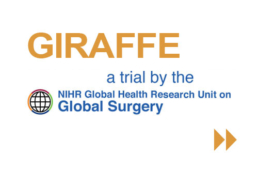
GIRAFFE STUDY
GIRAFFE (a patient-blinded, international, multicentre, cluster-sequence, randomised controlled study) uses an on-line education/training tool to improve in-theatre performance and perioperative care of patients undergoing emergency laparotomy and thereby seek to reduce postoperative hospital deaths.
Bringing together surgeons, researchers and policy makers to set the local research agenda according to patient need in LMIC and ensuring all patients have the opportunity to take part in our research.
SWATs
SWATs
Improving surgical outcomes through collaborative research
The NIHR Global Health Research Unit on Global Surgery
Improving surgical outcomes through collaborative research
SWATs
Surgical site infection (SSI) is a worldwide problem which has morbidity, mortality and financial consequences. Previous studies in LMICs on the costs of SSI have been limited by small sample size single-centre hospitals which did not capture costs occurring after hospital discharge. The lack of follow up is a problem as SSI can occur after discharge and costs associated with SSI have been shown to persist beyond 30 days.
The GSU aims to address this through research in patient follow-up mechanisms through its TALON, FEATHER and KIWI international studies, conducted in across our partner counties.
Further information on the individual studies and how they are helping to improve healthcare can be found by clicking on the study links below.
SWATs Research
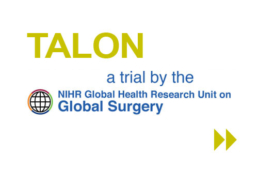
TALON STUDY
TALON is a sub-study embedded in the FALCON and CHEETAH trials, run as part of an NIHR Doctoral Research Fellowship in Global Surgery. The aim of the sub-studies is to improve the quality and efficiency of surgical trial methodology across low- and middle-income countries.
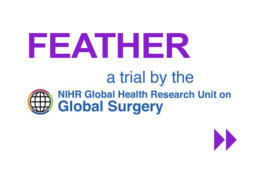
FEATHER STUDY
FEATHER is an investigation using qualitative methods embedded within several international multi-centre randomised trials (a study within a trial or SWAT).
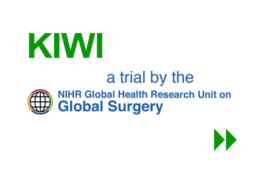
KIWI STUDY
The FALCON KIWI sub study is assessing the resource use and costs for patients with and without SSI across several hub countries. KIWI includes resource use collection (via additional CRFs) up to the 30-day follow-up assessment for patients and extended follow-up for any patients with an ongoing wound infection up to 60 days post-surgery.’
Bringing together surgeons, researchers and policy makers to set the local research agenda according to patient need in LMIC and ensuring all patients have the opportunity to take part in our research.
Perioperative Care
Perioperative care
Improving surgical outcomes through collaborative research
The NIHR Global Health Research Unit on Global Surgery
Improving surgical outcomes through collaborative research
Perioperative Care
Perioperative care is an umbrella term that includes every stage of a patient’s journey from the time they are identified for an operation, to the time they are discharged from hospital.
The GSU currently runs various trials, including PENGUIN, PROTECT Surg and GIRAFFE’.
Further information on each individual trial and how they are helping to improve healthcare quality on an international scale can be found by clicking on the study links below.
Perioperative Care Research
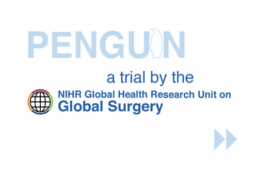
PENGUIN TRIAL
The PENGUIN trial is a 2 x 2 factorial, international pragmatic randomised trial. The trial aims to assess whether preoperative chlorhexidine mouthwash when compared to no-mouthwash-surgery can reduce incidence of post-operative pneumonia (POP) and whether perioperative liberal oxygen versus restrictive oxygen can reduce incidence surgical site infections (SSI) at 30-days among abdominal surgery patients.

GIRAFFE STUDY
GIRAFFE (a patient-blinded, international, multicentre, cluster-sequence, randomised controlled study) uses an on-line education/training tool to improve in-theatre performance and perioperative care of patients undergoing emergency laparotomy and thereby seek to reduce postoperative hospital deaths.
" Bringing together surgeons, researchers and policy makers to set the local research agenda according to patient need in LMIC and ensuring all patients have the opportunity to take part in our research. "
Wound Infection
Wound Infection
Improving surgical outcomes through collaborative research
The NIHR Global Health Research Unit on Global Surgery
Improving surgical outcomes through collaborative research
Wound Infection
Infection at the point of surgery, both during and following clinical operations is one of the leading causes of mortality in patients undergoing a clinical procedure. This is particularly an issue in settings in which access to sterile operating facilities is limited by poor medical infrastructures. The GSU aims to reduce mortality rates related to wound infection through research conducted via the FALCON, CHEETAH and PENGUIN trials.
Further information on each individual trial and how they are helping to improve healthcare quality on an international scale can be found by clicking on the study links below.
Wound Infection Research

FALCON TRIAL
The FALCON trial looks into the prevention of surgical site infections (SSI) in low- and middle- income countries.
The health economics sub-study within FALCON is named KIWI (Key Resource Use In Wound Infection).
Surgical site infection (SSI) is a worldwide problem which has morbidity, mortality and financial consequences .Previous studies in LMICs on the costs of SSI have been limited by small sample size single-centre hospitals which did not capture costs occurring after hospital discharge. The lack of follow up is a problem as SSI can occur after discharge and costs associated with SSI have been shown to persist beyond 30 days. The main FALCON trial is assessing different treatment combinations to reduce Surgical Site Infection (SSI). The FALCON KIWI sub study is assessing the resource use and costs for patients with and without SSI across several hub countries.

KIWI STUDY
The FALCON KIWI sub study is assessing the resource use and costs for patients with and without SSI across several hub countries. KIWI includes resource use collection (via additional CRFs) up to the 30-day follow-up assessment for patients and extended follow-up for any patients with an ongoing wound infection up to 60 days post-surgery.’

CHEETAH TRIAL
The main CHEETAH trial is assessing whether the practice of using separate, sterile gloves and instruments to close wounds at the end of surgery can reduce surgical site infection at 30-days post-surgery for patients undergoing clean-contaminated, contaminated or dirty abdominal surgery, compared to current routine hospital practice.
Using information from FALCON KIWI and primary data collection in CHEETAH, the cost-effectiveness of the changing gloves/instruments prior to wound closure compared to current routine hospital practice will be assessed.

PENGUIN TRIAL
The PENGUIN trial is a 2 x 2 factorial, international pragmatic randomised trial. The trial aims to assess whether preoperative chlorhexidine mouthwash when compared to no-mouthwash-surgery can reduce incidence of post-operative pneumonia (POP) and whether perioperative liberal oxygen versus restrictive oxygen can reduce incidence surgical site infections (SSI) at 30-days among abdominal surgery patients.
Bringing together surgeons, researchers and policy makers to set the local research agenda according to patient need in LMIC and ensuring all patients have the opportunity to take part in our research.







